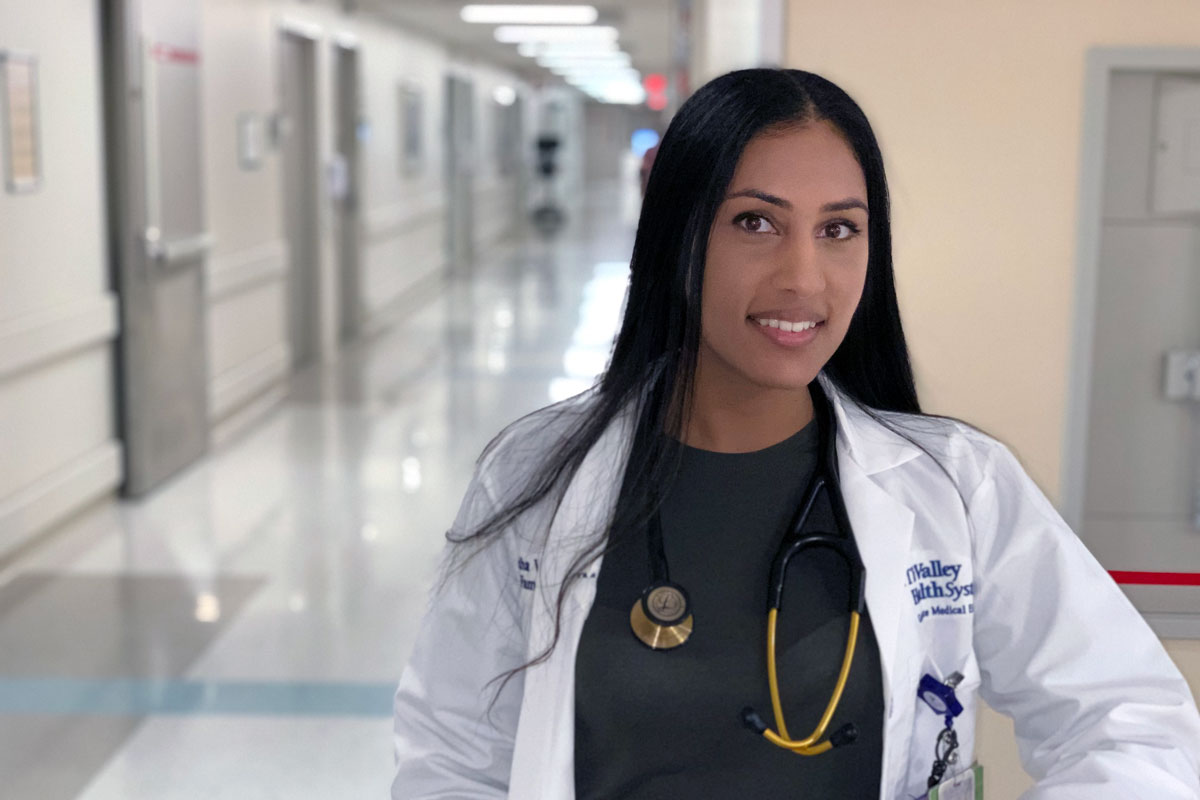Residents Rise to the Occasion During the Pandemic

Photo was taken prior to wearing masks becoming mandatory in Nevada
July 2, 2020
When Swetha Vakkalanka, MD, began her Family Medicine residency in July 2019, her days were filled with a mix of community medicine, Continuity Clinic and inpatient care plus a curriculum packed with lectures, group sessions and self-study. When the first cases of COVID-19 arrived in Las Vegas, it brought an entirely new dimension to Dr. Vakkalanka's residency career. Here she shares her thoughts on how the pandemic has transformed her first year in medicine.
How has the COVID-19 pandemic impacted your first year of residency?
In April, a few of us who were scheduled for NICU rotations or outpatient elective rotations were redeployed to help with inpatient adult medicine. It has been the most humbling and eye-opening experience. The information on management for COVID-19 is constantly changing and trying to stay up-to-date can be overwhelming. My fellow residents and I have been learning to integrate evidence-based medicine with anecdotal advice from other colleagues and superiors on the front line.
Our Family Medicine program was also very quick to implement telemedicine within our curriculum. It required minimal training as the online platform integrated seamlessly with the current electronic health record (EHR) software that we use in our outpatient clinic. We also have resources, such as webinars, hosted by experts in the field explaining how we may efficiently manage chronic ailments through this platform.
We were all very excited to get involved with telemedicine and do our part to help flatten the curve and lessen the burden on our healthcare system here in Nevada. It also helps keep medical professionals safe so we can be available to our patients.
Our residency program has also continued to maintain resident wellness as a top priority. From the weekly check-ins with faculty, monthly group sessions with a behavioral health team, access to resources such as Headspace, Sanvello memberships and links to wellness webinars, we are constantly reminded that making time for ourselves is paramount to us being able to provide the best care to our patients. During our weekly resident/faculty group video didactic sessions, we now each take a moment to express one thing we have been thankful for since the start of this pandemic.
How has the pandemic changed your interaction with patients during the telemedicine visits?
Telemedicine has been a fantastic way for us to connect with our patients regarding preventative medicine, while also allowing us to efficiently direct them to a more appropriate facility (i.e., urgent care vs. ER) for more emergent situations.
Regular hygiene practices cannot be stressed enough. I encourage patients to stay up-to-date with valuable information from the Centers for Disease Control and Prevention (CDC) and the World Health Organization (WHO). While the internet can be a huge source of information, it also comes with the potential risk of perpetuating false information. Patients should not hesitate to ask their healthcare providers for clarifications. I also encourage patients to view this pandemic from a broader perspective and reflect on how our lifestyle habits may not only directly impact our own lives but also others and the environment.
In addition to our physical well-being, it’s also important to focus on our mental health. I have always taken the time to explain to my patients how intimately connected our mind is to our physical body. I keep reminding them to remain positive as our state of mind can greatly impact the progression of any disease process. Unfortunately, there is no secret formula for maintaining one’s mental health, but there are resources that can help create a more personalized path. We are continuously getting the opportunity to learn about these resources available to our patients so that we may educate them. I also caution patients to limit the amount of news and media they may be watching to avoid excessive stress.
What information would you like to share with future residents?
Nothing will ever prepare you for the reality of working during a pandemic. That being said, the VHS Family Medicine residency program has truly felt like a family. Our directors and faculty members are extremely supportive and have been eager to guide us during this difficult time. We are all looking forward to growing this family with the incoming resident class.
How do you think the pandemic will influence the future of Family Medicine?
Looking ahead, it appears that Telemedicine is going to be a vital part of outpatient medicine even after quarantine restrictions are lifted. As patient follow-up can often pose a challenge, telemedicine may be one of the many long-term solutions. Telemedicine enhances personalized patient care in a safe and effective manner. Patients are enjoying this platform from the comforts of their home. My hope is that the convenience of access will allow patients to consistently follow up with their practitioners to continue the promotion of good health and prevention of disease in order to reach their healthcare goals.
How has the pandemic affected you personally?
As a healthcare worker on the front lines, it becomes very personal. It changes your perspective to see your patients directly affected, especially when you have formed personal bonds with them.
I've also been recognizing the global impact and how this pandemic has brought people together emotionally. Seeing everyone united has restored a lot of people's faith in humanity. In general, this experience has reminded me why I went into the medical profession. I want to be in service to others and stay connected with my community.
On a more personal note, I have several friends and family members who are physicians currently practicing during this pandemic. My mother is one of them, and while I often worry about her well-being, I am proud of her commitment to her patients.
